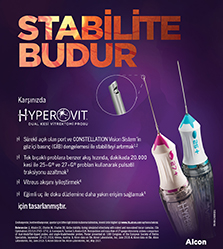Retina-Vitreous
2009 , Vol 17 , Num 4
Ocular and Systemic Complications Associated with Intravitreal Bevacizumab Injection
1ANEAH, 2. Göz Kliniği, Ankara, Asist. Dr.2ANEAH, 2. Göz Kliniği, Ankara, Uzm. Dr.
3ANEAH, 2. Göz Kliniği, Ankara, Doç. Dr. Purpose: This study is designed to evaluate ocular and systemic complications in patients with intravitreal bevacizumab, which can be used for the treatment of selected cases.
Materials and Methods: Between December 2006 and October 2009, 383 patients with different ocular pathology who were treated with intravitreal bevacizumab were included in the study. Total 1285 injections were performed. At least 1 and up to 10 repeated doses of intravitreal bevacizumab applied to 383 patients, in terms of ocular and systemic complications were evaluated retrospectively. At first day, first month, followed every 6 weeks, all patients were summoned to control. Minimum 3 months and maximum 2 years follow up results were discussed in the study. Patients were excluded if they had history of a cardiovascular, cerebrovascular, or peripherial vascular event in the 6 months before enrollment.
Results: Complication rate of the total group was 20.1% with ocular complications of 74 patients and systemic complications in 3 patients. Most predominant ocular complications were subconjunctival hemorrhage (n=35), ocular inflammation in the anterior chamber (n=29) and intraocular pressure increase (>30 mmHg) (n=5). Other ocular complications were noted as iatrogenic hole in the retina, localized retinal detachment, severe corneal epithelium defect, vitreous hemorrhage and hifema, each one was reported in only 1 patient. The systemic complications were transient ischemic attack (n=2) and increased systemic arterial blood pressure (n=1).
Conclusion: According to the results of our study, intravitreal bevacizumab injection may cause some ocular and rare systemic side effects. Keywords : Intravitreal bevacizumab, ocular and systemic complications




